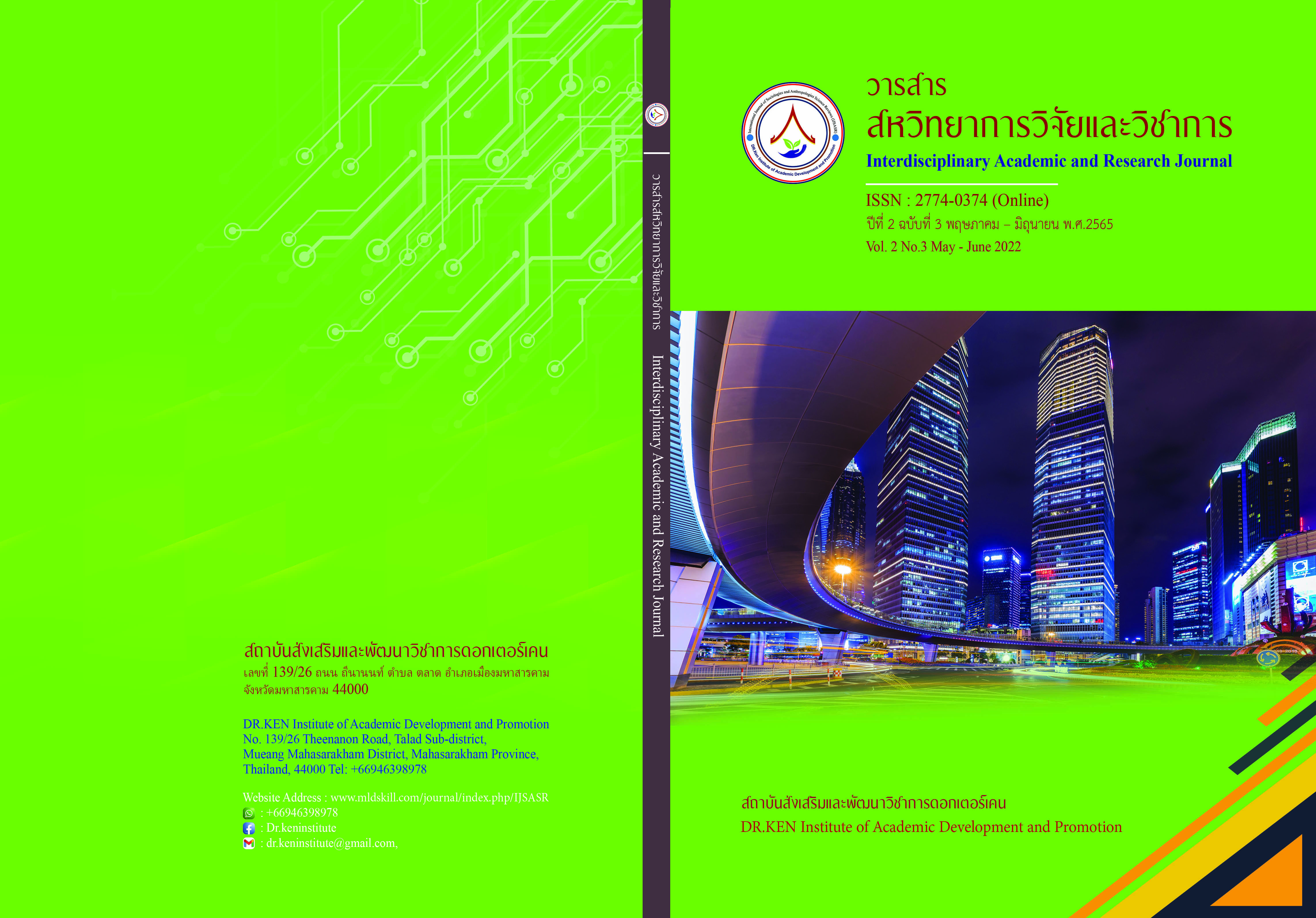Transcendental Leadership in Leader’s Strategies Management Under the 21st Century Dynamics Era
DOI:
https://doi.org/10.14456/iarj.2022.24Keywords:
Leader,, Transcendental Leadership,, Strategies Management, , the 21st Century Dynamics EraAbstract
The strategies management of having the deep and broad foresight, value for personnel and continuous improvement, sincerity to stakeholders, focus on innovation development, resource efficiency, use of appropriate technology, truth-based risk reduction, knowledge sharing, and corporate culture building from to knowledge create and understanding with the personnel educational administration to adaptation and working of effectiveness. Therefore, effective organizational strategies require effective leadership. The transcendental leadership in leader’s strategies management under the 21st-century dynamics era of ability to motivate the personnel of a working potential to succeed and achieve the organizational goals. A “Key” dimensions of sustainable transcendental leadership include leadership spirits, visions, morals and ethics, pursuing services, and leader competencies.
References
กนกอร สมปราชญ์. (2555). การบริหารเชิงกลยุทธ์. กรุงเทพฯ: ซัคเซสมีเดีย.
กีรติ ยศยิ่งยง. (2548). การวางแผนการพัฒนาทรัพยากรมนุษย์เชิงกลยุทธ์. กรุงเทพฯ: มิสเตอร์ ก๊อปปี้.
จุลศักดิ์ ชาญณรงค์. (2557). วัฒนธรรมองค์การระบบราชการ ความเมตตาและคุณภาพชีวิตการทำงาน. กรุงเทพฯ: มหาวิทยาลัยธุรกิจบัณฑิตย์.
ณัฏฐพันธ์ เขจรนันท์. (2552). การจัดการเชิงกลยุทธ์ (ฉบับปรับปรุงใหม่). กรุงเทพฯ: ซีเอ็ดยูเคชั่น.
ทวีศักดิ์ สูทกวาทิน. (2551). การจัดการทรัพยากรมนุษย์เชิงกลยุทธ์. : Strategic human resource management. กรุงเทพฯ: คณะรัฐประศาสนศาสตร์ สถาบันบัณฑิตพัฒนบริหารศาสตร์.
ธีระ รุญเจริญ. (2553). ความเป็นมืออาชีพในการจัดและบริหารการศึกษายุคปฏิรูปการศึกษา (ฉบับปรับปรุง)เพื่อปฏิรูปรอบ 2 และประเมินภายนอกรอบ 3. พิมพ์ครั้งที่ 5. กรุงเทพฯ: ข้าวฟ่าง.
พรชัย เจดามาน. (2560). การจัดการทรัพยากรมนุษย์โดยใช้หัวใจและมันสมอง. พิมพ์ครั้งที่ 2. กรุงเทพฯ: สำนักพิมพ์สูตรไพศาลบิวเดอร์.
พรชัย เจดามาน. (2562). ภาวะผู้นำเชิงกลยุทธ์ในศตวรรษที่ 21 เพื่อการเปลี่ยนผ่านการบริหารจัดการศึกษา 4.0 อย่างยั่งยืน. วารสารมหาวิทยาลัยราชภัฏมหาสารคาม, 13 (2), 27-35.
สุเทพ พงศรีวัฒน์. (2557). ภาวะผู้นำแบบเหนือชั้น. [ออนไลน์]. เข้าถึงไดจาก : http://suthep.crru.ac.th.
อัครพงษ์ สุขมาตย์ พรชัย เจดามาน และคณะ. (2560). ภาวะผู้นำแบบยั่งยืนในศตวรรษที่ 21 ภายใต้กรอบการศึกษาประเทศไทย 4.0. วารสารครุศาสตรอุตสาหกรรม, 16 (2), 1-7.
Absee, A., & U-senyang, S. (2022). Transformational Leadership Among Administrators of the Local Government Administration. Interdisciplinary Academic and Research Journal, 2(1), 1–16. https://doi.org/10.14456/iarj.2022.2
Balderson. (2007). The Effects of a Personal Accountability and Personal Responsibility Model on Urban Elementary Student Positive Social and Off-task Behaviors. Masters Abstracts International: 42 (3), 746.
Bennis, W., & Townsend, R. (2008). Reinvention leadership: Strategies to empower the organization. New York: William Morrow.
Cardona, P. (2000). Transcendental leadership. Leadership & Organization Development Journal: 21 (4), 201-207.
Chen, Yongxia, Jia, Liangding & Li, Chaoping et al. (2018). Reforming Leader, Psychological Empowerment, and Employee’s Organizational Commitment: Empirical Research in China. Management World. No.1., 96-105.
Cook, J. D., & Wall, T. D. (2016). New work attitude measures of trust, organizational commitment and personal need non-fulfillment. Journal of Occupational and Organizational Psychology, 53, 39–52.
Dessler, G. (1999). Essentials of Management. Upper Saddle River, NJ: Prentice Hall.
Forcadell, F. J. & Guadamillas, F. (2002). A Case Study on the Implementation of a Knowledge Management Strategy Oriented to Innovation. Knowledge and Process Management, 9(3),162-171
Kholo-asae, A., & U-senyang, S. . (2022). The Innovative Leadership of School Directors. Interdisciplinary Academic and Research Journal, 2(2), 125–140. https://doi.org/10.14456/iarj.2022.17
Liu, C.H. (2007). Transactional, Transformational, transcendental leadership: Motivation effectiveness and measurement of transcendental leadership. University of Southern California.
Northouse, P. G. (2010). Leadership: Theory and practice. 5th ed. Thousand Oaks: SAGE.
Sanders, J.E., Hoppkins, W.E., & Geroy, G.D. (2019). Transactional to transcendental: Toward an integrated theory of leadership. Journal of Leadership & Organizational Studies, 9(4), 21-31.
Srisuk. S., & U-senyang, S. (2022). The Relationship Between Innovative Leadership and Innovative Organization of Local Government Organizations in the Southern Border Provinces. Interdisciplinary Academic and Research Journal, 2(2), 1–14. https://doi.org/10.14456/iarj.2022.9
Strack & Fotter. (2002). Spirituality and effective Leadership in healthcare: is there a Connection. Frontiers of health service management, 18(4), pp. 3-18.
U-senyang, S. (2022). Ethical Leadership: Factors Affecting Happiness Organizations. International Journal of Sociologies and Anthropologies Science Reviews (IJSASR), 2(2), 17–28. https://doi.org/10.14456/jsasr.2022.9
Yukl, G. A. (2018). Leadership in Organizations. 8th Edition, Prentice-Hall, Upper Saddle River.
Downloads
Published
How to Cite
Issue
Section
License
Copyright (c) 2022 Pornchai Jedaman, Sanya Kenaphoom, Angkana Udompan

This work is licensed under a Creative Commons Attribution-NonCommercial-NoDerivatives 4.0 International License.
Copyright on any article in the Interdisciplinary Academic and Research Journal is retained by the author(s) under the under the Creative Commons Attribution-NonCommercial-NoDerivatives 4.0 International License. Permission to use text, content, images, etc. of publication. Any user to read, download, copy, distribute, print, search, or link to the full texts of articles, crawl them for indexing, pass them as data to software, or use them for any other lawful purpose. But do not use it for commercial use or with the intent to benefit any business.
















.png)


